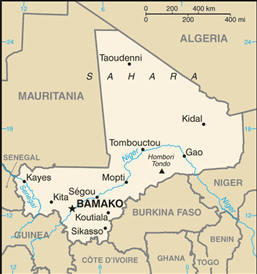A small group of U.S. military personnel are deployed to Mali “on stand-by,” despite Washington’s official suspension of military cooperation following last month’s coup, as negotiations for a return to civilian rule supposedly continue.
 Over the weekend, U.S. Africa Command dispatched a team of rotating “advisory troops” to the capital, Bamako.“The U.S. military members will not engage with the Malian military … until the current situation is resolved and the U.S. Government approves restitution of the long-standing U.S.-Malian partnership,” Nicole Dalrymple, an AFRICOM spokeswoman, said in a statement.
Over the weekend, U.S. Africa Command dispatched a team of rotating “advisory troops” to the capital, Bamako.“The U.S. military members will not engage with the Malian military … until the current situation is resolved and the U.S. Government approves restitution of the long-standing U.S.-Malian partnership,” Nicole Dalrymple, an AFRICOM spokeswoman, said in a statement.
While the U.S. has suspended about half the aid it sends to the Mali government, the Obama administration has not yet made a formal decision as to whether a military coup has taken place in Mali. Such a finding would require the Washington to cut off all aid. “We’re still considering this a ‘mutiny’ with uncertain results,” Nuland said.
The Obama administration took a similar position toward Honduras after the military coup there in 2009, declining to officially categorize it as a coup and continuing to send military and economic aid to the increasingly violent and corrupt regime. Now, Washington’s ties to Honduras are strong as ever, as the U.S. tries to maintain dominance in Central America under the rubric of the war on drugs.
Mali’s coup leaders have not ceded power to civilian rule as they had promised, despite harsh economic sanctions imposed on the country by neighboring West African leaders in the Economic Community of West African States (ECOWAS). As a next step, leaders in the neighboring countries are meeting to draft plans for a possible military intervention to force the junta from power.
While there is some talk from Mali’s Tuareg insurgents that fighting will cease, that has yet to bear out in actions. Meanwhile, the Islamist coup leaders have announced they will impose sharia law.
The spark to all the instability in Mali, which is leading to severe repression and possibly regional conflict, is still being laid at the U.S.-NATO. Robert Fowler, a former UN regional envoy, told the Guardian, “Whatever the motivation of the principal Nato belligerents [in ousting Gaddafi], the law of unintended consequences is exacting a heavy toll in Mali today and will continue to do so throughout the Sahel as the vast store of Libyan weapons spreads across this, one of the most unstable regions of the world.”


